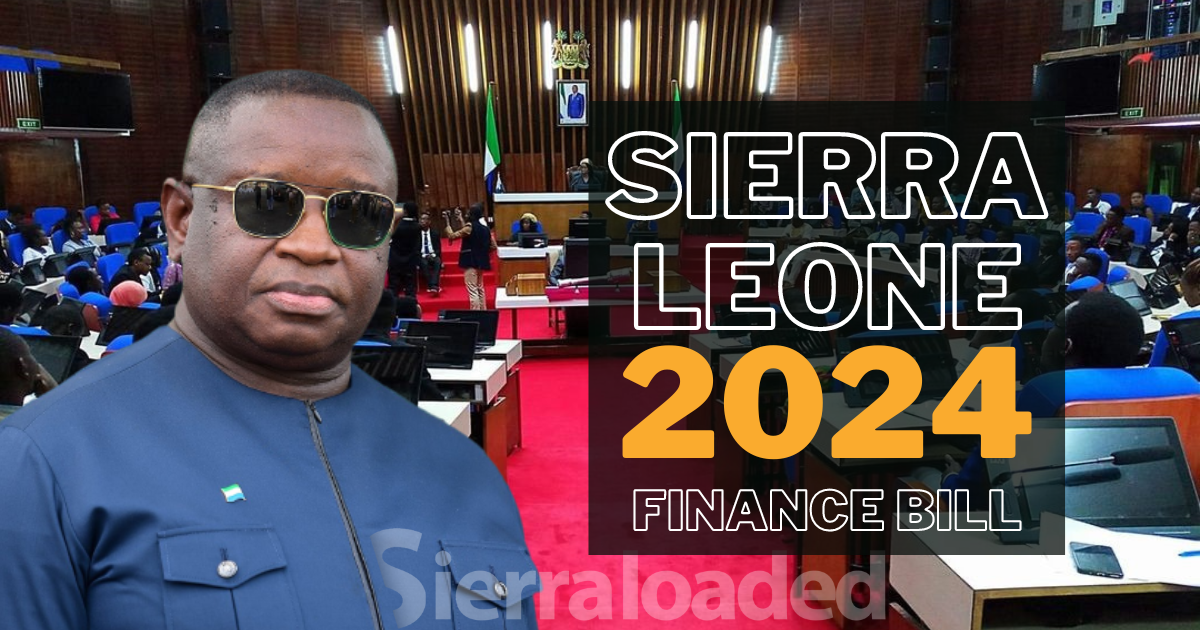The government of Sierra Leone has presented the Finance Bill 2024 before parliament, proposing several new taxes and fiscal adjustments aimed at enhancing revenue mobilization and promoting economic growth.
The Bill, presented by Finance Minister Sheku Ahmed Fatamadi Bangura on Thursday, October 9, 2023, includes key provisions aimed at bolstering revenue mobilization and fostering fiscal sustainability. One of the key proposals within the Finance Act, 2024 is the amendment to the Customs Tariff Act, introducing a new 5% import duty tax on imported rice, slated to come into effect on January 1, 2024, and subsequently increasing to 10% from January 2025.
Among the crucial provisions outlined in the Finance Bill 2024 is the reduction of the Minimum Alternate Tax (MAT) rate from 3% to 2%, accompanied by adjustments to its applicability. Additionally, the bill introduces an income tax derived from digital products and services provided by global giants such as Google, Meta, and Amazon, targeting consumers in Sierra Leone.
The Finance Bill also addresses Withholding Tax rates, with adjustments made to Dividends, Management and professional Fees, Rent, and Lottery Winnings, all set at a standardized rate of 15%. Furthermore, a 1% Education Levy has been introduced to support educational initiatives.
In a bid to streamline fiscal policies, the government has harmonized Excise Duty rates for both domestic and import sectors. Notably, Excise Duty has been introduced on petroleum and plastic products.
Several other provisions are included in the Finance Bill 2024, such as the introduction of a 5% Excise Duty on gambling, betting, and lottery activities. Stamp Duty undergoes adjustments with multiple rates applicable to property and other transactions.
The Goods and Services Tax registration threshold has been raised from SLE 100,000 to SLE 500,000, aiming to provide relief to smaller businesses. Moreover, the Finance Bill 2024 reintroduces GST exemption for plant and machinery in the agriculture, manufacturing, mining, and petroleum sectors.
In a strategic move to boost the manufacturing sector, the bill introduces Duty exemptions for plant and machinery related to specific manufacturing elements. Demurrage days have also been adjusted, shifting from weekdays to official working days.
The Finance Bill 2024 reflects the government’s commitment to fostering economic growth, encouraging investment, and ensuring financial stability through a well-structured fiscal policy. The proposed amendments are poised to have a substantial impact on revenue generation and the overall economic landscape of Sierra Leone. The bill is now under parliamentary scrutiny, with stakeholders eagerly awaiting its outcomes.












Pa continue for suffering the people but we nor go die in JESUS Name
Pa continue for suffering your people but we nor go die in JESUS Name
God go help we
More suffering on the way
This Bill utterly a disgrace for our economic growth and it gear towards only for the rich and well off in society and has no to the poor I the country ,but only misery . Shame to the Bio led stolen regime government
The Sierra Leone Government’s unveiling of the Finance Bill 2024 has sparked concern among citizens, given the proposed new taxes and fiscal adjustments in light of the current economic challenges. Many citizens are expressing dissatisfaction with the impact of these measures on their daily lives and the overall economic situation.
The proposed 5% import duty tax on rice, set to increase to 10% in 2025, has raised eyebrows, as rice is a staple in many households. The reduction of the Minimum Alternate Tax (MAT) rate is noted, but citizens are closely watching the practical implications of this change.
The introduction of an income tax on digital products and services from global giants is viewed with mixed sentiments. While aiming to enhance revenue, citizens are wary of potential consequences on the cost of living.
As citizens navigate these economic challenges, there’s a prevailing sentiment that the government should prioritize measures that alleviate the burden on the average person. It’s a critical time for open dialogue and collaboration to ensure that economic policies align with the well-being of the people.
More burden looming on our people
I don’t think if government is really working for the citizens because our money is not value we don’t have enough job we have lot of graduate but not job government need to look to this taxes us if not I’m afraid
God please help us, this is beyond our reach, the price of a bag of rice right now is 680,000 some 700,000 old Le
We go learn sense.
Will this bill stabilise the price of commodities and reduce the cost of transportation? I hope so or else it will be irrelevant to the average Sierra Leonean.
May God help us through
Paopa Sa lone for betteh
Dis
Usai Dem born we, dem dae pepper we!!!
Sierra Leone for better ma 😂😂😂😂😂😂😂